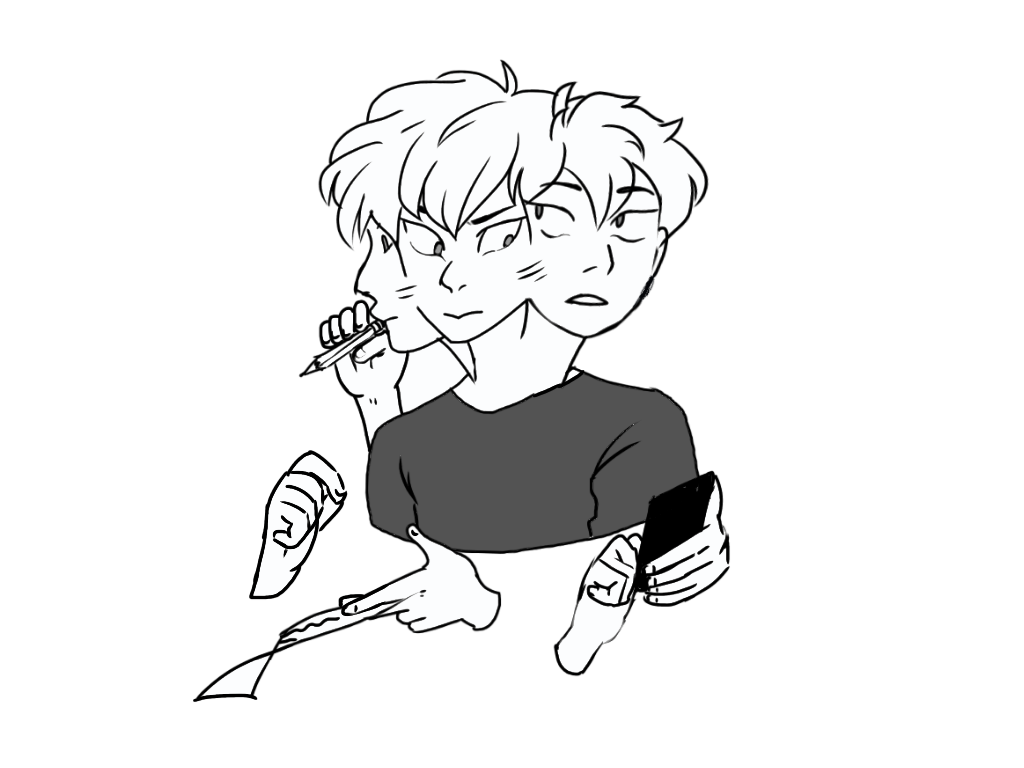
By Victoria Fong and Grace Marshall
Diagnosing and symptoms
“With ADHD, it’s like you physically cannot control yourself; you stare into space; you look at everything; you want to do everything except what you know you have to do,” says sophomore Kira*. Kira was diagnosed with ADHD about a year and a half ago, but her problems with attention and focus began much earlier in her childhood. She says, “My mom thought I’d been struggling with it for a while … since elementary school, she’s always know that I’d have attention problems.”
According to WebMD, those with attention deficit hyperactivity disorder, or ADHD as it’s commonly called, “may be hyperactive and unable to control their impulses. Or they may have trouble paying attention.”
While identifying students with ADHD, Aragon’s wellness counselor Jill Ma explains, “You’re really looking for students who can’t sit still, who physically have a really hard time just sitting and attending, students who have a really hard time focusing on one thing.”
Attention deficit disorder (ADD) is a variant of ADHD, but has the absence of hyperactivity in those who have it. Thus, those with ADD are not as hyper and impulsive as individuals with ADHD, but still have difficulties focusing. “Something that people say is that it’s not that they can’t pay attention, it’s that they pay attention to everything,” adds Ma.
Although the symptoms of ADD and ADHD may be visually apparent, ADD and ADHD are often difficult to diagnose due to the lack of concrete symptoms that are presented. Kira comments, “The doctors really don’t like to ‘diagnose’ it because there’s really no definitive tests for it, so it’s more of an ‘if your doctor thinks so or not’ kind of thing.”
Despite the fact that many people experience jumpiness and inattentiveness from time to time, those with ADD or ADHD have more chronic and sometimes detrimental occurrences. Senior Josh*, who has ADD, says, “For someone who has a hard time focusing in general, I think that’s more of a voluntary thing, but for me, it’s a little bit involuntary. Something else will mentally draw me away and I’ll have no control over it.”
Similarly, junior Claire Thorneycroft gets distracted frequently when she tries to focus on a task because of her ADHD. Thorneycroft describes, “When I’m practicing [viola], it’s easier to focus, but then I still get distracted. A lot of the times, if I’m supposed to focus on, say a concerto, I’ll be like ‘Oh, I’m supposed to focus on my concerto.’ But then I’ll move onto other things. Subconsciously I’ll be just like ‘Okay, yeah’ and then I’ll be like ‘Wait, no, need to practice that thing.’”

On the other end of the spectrum, Thorneycroft can perform certain tasks without thinking about them. “I guess there are things for me … where I can focus on it, like my actual actions, but [my] head doesn’t need to be focused on it,” Thorneycroft explains. “I’m really interested in make up and I always have been … So for me, that’s the thing where my actions can do it, but I don’t think I have to be thinking about it.”
However, Thorneycroft does not feel as if her ADHD significantly impacts her performance at school or in her extracurricular activities. She comments, “I still do pretty well in school. Not to brag, but it’s not like I’m failing tests all the time.”\
Conversely, Kira’s symptoms can cause her difficulties at school. She says, “I know that I have to try a lot harder to keep my grades up and stuff because I get super easily distracted both … when I’m studying and in class.”
To help Kira stay focused, she takes methylphenidate, a stimulant which helps her focus for long periods of time. “The medication doesn’t really make me feel any different physically,” notes Kira, “but when I sit down to do homework, I find that it’s a lot easier to get stuff done.” Kira made the decision to start taking methylphenidate in high school and says, “I decided going into high school that it wouldn’t hurt to try it because my grades actually matter now.”
On the other hand, Thorneycroft chooses not to take any medication for her ADHD and explains, “I don’t [take medication] because they have so many horrible side effects, so my parents just never put me on one.”
Stigmas
ADD and ADHD can also significantly influence a student’s social life. As a child, junior Joelle*, who has ADD and autism, found it challenging to socialize with other kids. “When I was young,” Joelle describes, “I literally had no friends in elementary school and was bullied by everybody and was usually the target of everyone to pick on.” With Joelle feeling a social disconnect with her peers, her parents helped her improve her social skills. “Back then, my parents were talking about how I could improve socially,” she says. “In terms of directions, they were always [telling] me ‘look at someone when they’re talking’, ‘don’t be too loud’, ‘talk about their topic’, ‘don’t interrupt.’” However, Joelle still feels the detrimental affects of her autism and ADD and says, “Even my parents admit that although that advice was really helpful, in the end, I’m a less confident person in myself.”
Unlike Joelle’s ADD, Thorneycroft’s ADHD is less obvious. However, one time, a friend of hers picked up on her high energy and Thorneycroft remembers, “One of my friends noticed it. He was like, ‘You’re really all over the place, even in conversations,’ and I was like, ‘Here’s the thing …’” This was Thorneycroft’s first time talking to someone about her ADHD, and although she doesn’t keep it a secret, she still felt vulnerable when telling her friend for the first time and explains, “I guess you’re just scared that people are going to see you differently because you have a [mental health problem].”
While individuals with ADD and ADHD face many challenges, their experiences are often minimized by stereotypes and generalizations associated with people who have a hard time focusing. Ma shares her experience with parents who have students with ADD or ADHD and comments, “I’ve worked with a lot of parents who are well-meaning, but they might say something [about their child] like, ‘Oh yeah, you know, they just need more discipline,’ or ‘They just need to buckle down and do their work,’ and they need to just ‘stop and figure it out.’”
Along the same lines, although Thorneycroft’s mom has ADHD too, she notes that her father doesn’t understand her ADHD and her brother’s ADD. “It’s very easy for him to focus,” Thorneycroft explains. “It’s very easy for him to just sit there and get absorbed into what he’s doing and I don’t get that, even if I enjoy what I’m doing. He just doesn’t understand it.”
Misunderstandings about ADD and ADHD may also come from parents not realizing the significance of their child’s mental health problems. Thus, Ma compares mental health to physical health, emphasizing the importance of both and says, “If your child had an illness or broke their arm, you’d take them to the doctor, right? It doesn’t always feel like same thing, but it really is the same thing. If you’ve got something going on with your learning or your social-emotional stance, or anything like that, you [should] address that, too.”
At the same time, Josh relates to Ma’s experiences with parents and adds, “A lot of people think that ADD is not a real mental issue, so I do think there is a stigma [for people with ADD and ADHD].”
In addition, Thorneycroft, whose younger brother also has ADD, believes that these stereotypes negatively impact her brother in the classroom. “For him, I think a lot of teachers just see him as lazy,” she says. Because of this, she tries to help him as much as she can and adds, “If I’m doing homework, I’ll sit next to him and get him to try and do his homework. It works sometimes, [but] a lot of the time he ends up getting distracted.”
Even though many see students who have ADD or ADHD with a glass-half-empty perspective, Ma explains how the glass is also half full. “I’ve worked with very, very highly intelligent students with ADHD, and they’re able to remember things,” Ma says. “There can be a high level of taking a lot of information in and being able to do things quickly [and] having skills that are a little bit faster.”
Growing up with ADD and ADHD
Although it was commonly believed that adults “outgrew” ADD and ADHD, WebMD cites brain development and growing familiarity over time with the disorder as reasons for why fewer adults have a diagnosis of ADHD. Josh, for example, has become more familiar with his ADD and knows which environments he’s able to concentrate best in. He says, “I am able to focus when I am alone in the library, listening to music and oblivious to anything else except my work.” Like Josh, Kira says, “I like to completely clear my workspace and have absolutely nothing around to distract me.”
For Thorneycroft, her inability to sit still has improved over the years. “I used to walk around my kindergarten classroom a lot … but now I guess the classroom set of rules has been beaten into me more,” Thorneycroft adds. “Now I’ll just move my leg or something.”
Because of her ADHD, Thorneycroft has learned a lot about herself and finds a sense of pride in overcoming challenges with it. “When I think about it though, I think it makes me more proud of myself in a way that I’ve been able to take all these AP classes with this,” says Thorneycroft. Along the same lines, Joelle believes, “I don’t think ADD or ADHD is really … a stigma, because nowadays, a lot more people are getting it, and still succeeding.”
*Names have been changed to protect students’ privacy.




